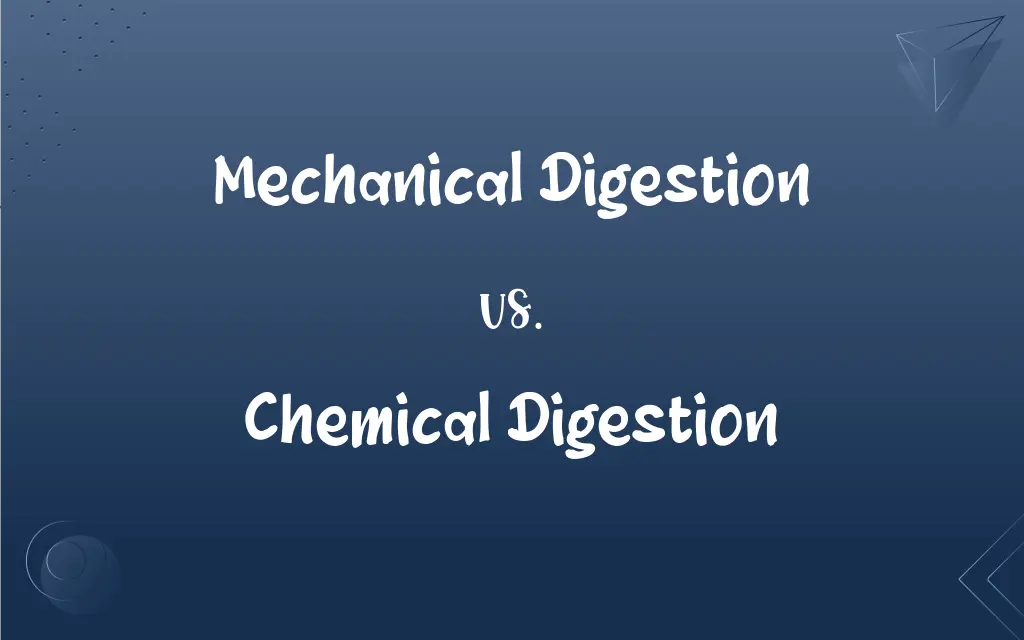Mechanical Digestion vs. Chemical Digestion: What's the Difference?
Edited by Aimie Carlson || By Harlon Moss || Updated on October 16, 2023
Mechanical digestion physically breaks down food; chemical digestion breaks food down via enzymes and acids.

Key Differences
Mechanical digestion involves the physical breaking apart of food into smaller pieces. On the other hand, chemical digestion is the process by which food is broken down into its nutrient components through the action of enzymes and other chemicals.
When we chew our food, we're engaging in mechanical digestion, as our teeth grind and tear food into smaller bits. In contrast, when our stomach releases acids and enzymes to further break down that food, that's chemical digestion at work.
Mechanical digestion doesn't alter the chemical structure of food but simply reduces its size. However, chemical digestion transforms the molecular structure of food, turning complex molecules into simpler ones.
The primary site of mechanical digestion is the mouth, where food is chewed by teeth and mixed with saliva. Chemical digestion, on the other hand, begins in the mouth with salivary enzymes and continues in the stomach and intestines.
Mechanical digestion aids chemical digestion by increasing the surface area of food, making it more accessible to enzymes. While both processes are essential for digestion, mechanical digestion prepares food for the chemical digestion that extracts nutrients.
ADVERTISEMENT
Comparison Chart
Definition
Physical breakdown of food
Breakdown of food through enzymes and acids
Effect on Food's Structure
Does not change the chemical structure
Changes the molecular structure
Primary Sites
Mouth
Mouth, stomach, and intestines
Involvement of Enzymes
No enzymes involved
Enzymes play a crucial role
Purpose
Increase surface area for chemical action
Extract and absorb nutrients from food
ADVERTISEMENT
Mechanical Digestion and Chemical Digestion Definitions
Mechanical Digestion
Physical process of breaking down food.
Chewing is a part of mechanical digestion.
Chemical Digestion
Process of breaking down food with enzymes.
Salivary amylase begins chemical digestion in the mouth.
Mechanical Digestion
Action that increases the food's surface area.
Through mechanical digestion, enzymes can access food more easily.
Chemical Digestion
Transformation of food's molecular structure.
Chemical digestion turns complex carbs into simple sugars.
Mechanical Digestion
Digestion initiated by movement and pressure.
The churning of the stomach aids mechanical digestion.
Chemical Digestion
Degradation of food through chemical reactions.
Stomach acid plays a pivotal role in chemical digestion.
Mechanical Digestion
Process that prepares food for chemical breakdown.
Mechanical digestion ensures that food is ready for enzymatic action.
Chemical Digestion
Enzymatic action that extracts nutrients.
Chemical digestion in the intestines absorbs vital nutrients.
Mechanical Digestion
Grinding and tearing of food into smaller pieces.
Our teeth play a vital role in mechanical digestion.
Chemical Digestion
Conversion of macromolecules into absorbable forms.
Chemical digestion ensures our body gets the needed nutrients.
FAQs
Where does chemical digestion start?
Chemical digestion starts in the mouth with enzymes like salivary amylase.
What initiates mechanical digestion?
Mechanical digestion begins with chewing in the mouth.
How does mechanical digestion aid chemical digestion?
Mechanical digestion increases food's surface area, making it more accessible for enzymatic action.
Are acids involved in chemical digestion?
Yes, stomach acids play a significant role in breaking down food chemically.
What role do enzymes play in chemical digestion?
Enzymes facilitate the breakdown of food into its nutrient components in chemical digestion.
What are the main outcomes of chemical digestion?
The main outcomes are simpler molecules that the body can absorb and utilize.
How does saliva aid in mechanical digestion?
Saliva moistens food, making it easier to chew and swallow.
Can enzymes work without mechanical digestion?
While enzymes can work without it, mechanical digestion enhances the efficiency of enzymatic action.
Is the intestine involved in chemical digestion?
Yes, the intestines have enzymes that continue the chemical breakdown of food.
Can food be absorbed without chemical digestion?
No, nutrients must be broken down into simpler forms for absorption.
Why is the churning action of the stomach important?
Churning mixes food with digestive juices, aiding both mechanical and chemical digestion.
Does mechanical digestion involve enzymes?
No, mechanical digestion is a physical process and doesn't involve enzymes.
Is the stomach involved in mechanical digestion?
Yes, the churning action of the stomach contributes to mechanical digestion.
What's the key difference between mechanical and chemical digestion?
Mechanical digestion physically breaks down food, while chemical digestion alters food's molecular structure.
What role do teeth play in digestion?
Teeth are essential for mechanical digestion, grinding and tearing food.
How does mechanical digestion affect the speed of chemical digestion?
By increasing food's surface area, mechanical digestion can speed up chemical digestion.
Does all food undergo both mechanical and chemical digestion?
Most foods undergo both processes to be effectively broken down and absorbed.
Why is chemical digestion vital for health?
Chemical digestion allows the body to absorb and utilize essential nutrients from food.
Are enzymes specific in chemical digestion?
Yes, specific enzymes target specific nutrients, like proteins or carbohydrates.
Does mechanical digestion change food's chemical structure?
No, it only reduces food's size without altering its molecular composition.
About Author
Written by
Harlon MossHarlon is a seasoned quality moderator and accomplished content writer for Difference Wiki. An alumnus of the prestigious University of California, he earned his degree in Computer Science. Leveraging his academic background, Harlon brings a meticulous and informed perspective to his work, ensuring content accuracy and excellence.
Edited by
Aimie CarlsonAimie Carlson, holding a master's degree in English literature, is a fervent English language enthusiast. She lends her writing talents to Difference Wiki, a prominent website that specializes in comparisons, offering readers insightful analyses that both captivate and inform.































































